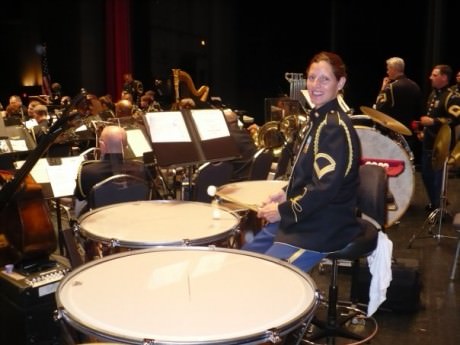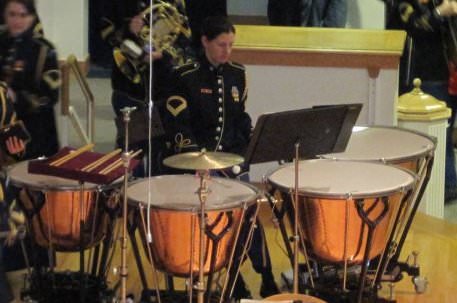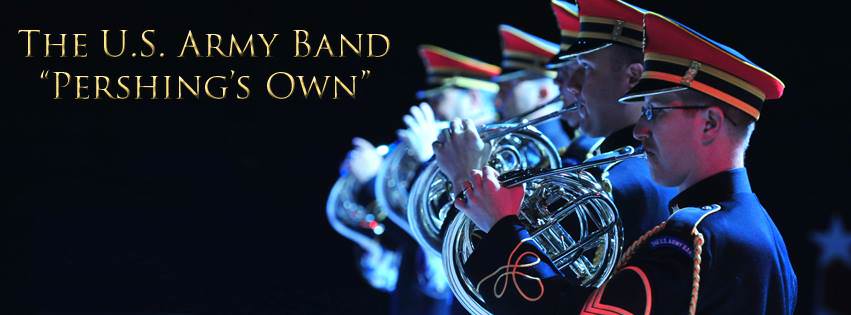Sergeant First Class Julie Angelis Boehler is the Principal Timpanist of The United States Army Band “Pershing’s Own.” In 2003, she became the first female Timpanist to serve in The U.S. Army Band. She began her career as a percussionist in the Ceremonial Band after winning an audition in early 1997. Her unit is comprised of highly-skilled musicians, most of whom have advanced degrees. Boehler holds a Bachelor of Music Education Degree cum laude from The University of Massachusetts-Amherst and a Master of Music in Percussion Performance from Rice University in Houston, Texas.

In 2003, she made her debut as Principal Timpanist at the Overture to 1812 concert that used to occur annually on The National Mall (watch a concert at the end of this interview). She was also featured in a documentary that was made when the Concert Band traveled to China in 2012 to perform joint concerts with the People’s Liberation Army Band to show the importance of understanding different cultures through music.
Marlene: What was it about the timpani that made you want to become a timpanist? What is so unique about the timpani? How many drums are in a timpani?
Julie: I started playing the rudimental snare drum in a Drum & Bugle Corps from Massachusetts when I was eight years old. I did not start playing the timpani until high school. I was fortunate enough to grow up in Worcester, MA, home to Mechanics Hall which holds an annual Music Festival that features world renowned orchestras. Because the stage is smaller than average, the timpanists were always placed visibly behind and above the orchestra. It gave me the opportunity to learn by watching some of the greatest timpanists in the world. I was immediately drawn to the enormous set of four copper bowls that set the timpanist apart from the rest of the percussion section. So, to answer your question, a set of timpani usually consists of four drums: 23″ 26″ 29″ and 32.” They are arranged in an arc around the player.
Where did you study to become a professional timpanist and what courses did you take?
I already mentioned where I received degrees, but the real training came from attending various music festivals. After high school, I spent a summer at Tanglewood studying with members of The Boston Symphony. I also spent summers between college semesters attending various festivals such as The National Orchestral Institute in College Park, MD; The Pacific Music Festival in Sapporo, Hokkaido, Japan; The Spoleto Festivals in Charleston, SC and Spoleto, Italy where I had the amazing chance to play for Pavarotti; and as timpanist of The National Repertory Orchestra in Breckenridge, CO. I would be remiss to not mention that I attribute my extra attentive skills to playing the timpani in tune and musically to my experiences singing in choirs. Many drummers can lay down time and have technical abilities. But a true timpanist knows how to tune by ear to the ensemble, not an electronic tuner. Likewise, being able to breathe properly with the musical phrases comes from singing.
How and when did you become a timpanist for the US Army Band? Where and when was your first performance in the Army Band?
It was apparent at my audition in 1997 that I was a timpanist who could also play percussion really well. While marching around playing rudimental percussion on a daily basis, I kept my skills up by freelancing for seven years in the evenings as acting principal timpanist with the Annapolis Symphony Orchestra when time permitted. So, when the Army Band timpanist retired, I was appointed to his chair in 2003. That first performance as Principal Timpanist occurred ten years ago at the annual Overture to 1812 concert on the National Mall. I vividly remember how exciting it was to perform Aaron Copland’s Fanfare for the Common Man amongst other things in front of thousands of people.
You’ve had some amazing experiences appearing with many famous and talented artists like Luciano Pavarotti. Who were some of your favorites and what did you enjoy most about appearing with Pavarotti?
My experience performing for Pavarotti was the last gig that I did as a civilian before I was shipped off to Basic Training at Ft. Leonardwood, MO. It was literally the turning point in my career. With the Army Band we’ve been extremely fortunate to have numerous stars perform with us, most often at our Holiday Festival concerts which used to take place at DAR Constitution Hall. My favorites were Kenny Loggins and Lou Rawls. Wynonna Judd gave a special performance for the Wounded Warriors at the former Walter Reed Army Hospital that was one of the most heart wrenching jobs I’ve ever been a part of. I’ll also never forget the energy of the rock band Kansas when they performed with us on Veterans Day a couple of years ago. Playing “Carry on my Wayward Son” on the timpani was a trip!
What other instruments do you play and/or enjoy? Which ones that you don’t play do you wish you had learned to play?
Besides timpani, I can play snare drum, xylophone, glockenspiel, and an array of concert percussion like the triangle, tambourine, maracas, slapstick, cowbell, chimes, marimba, vibraphone, and cast iron frying pans…..really! One of my bucket list dreams is to travel to Cuba, India and Ghana to study world percussion with their master percussionists.
How many concerts and performances do you and the Army Band play every year?
I perform so often that it’s impossible to keep track of everything. I primarily play timpani with the Concert Band and Orchestra, but also play marching percussion for the Ceremonial Band for various ceremonies in the Metropolitan Washington DC area and abroad. One of my favorite trips with the band was to Oslo, Norway for an international military tattoo. I’ve marched in hundreds of parades in my lifetime, yet marching down the streets of Oslo while it lightly misted was nothing short of magical.
What is the Army Band’s role in the DC area?
The Army Band plays a very important role in Washington, DC. We are the band that leads the Inaugural parades and performs summer concerts at the steps of the U.S. Capitol. We have ensembles that perform for visiting dignitaries who are here to make world-changing decisions. One of the highest honors is to perform for our fallen soldiers who are buried in Arlington National Cemetery. I have participated in thousands of funerals. Our commitment to excellence spans the scope of what we do.
Whose funeral moved you the most and what did the band play at this funeral?
Most recently, I had the honor of paying my last respects to the family of one of our former percussionists who was laid to rest last month. Master Sergeant Gordon “Don” Tanner was a legend who retired in 1967. He played for numerous jazz greats including Sinatra as well as the Inauguration and funeral for President Kennedy. I will forever remember his witty smile and stories that he shared when I last saw him at an Army Band reunion five years ago.
What other timpanists do you admire, and why?
This is one of the hardest questions to answer. As a timpanist, I don’t get the opportunity to hear many other timpanists perform live. The first one who comes to mind is David Herbert who recently left the San Francisco Symphony to accept a position with the Chicago Symphony. His dedication to the art of timpani is clearly above and beyond most other living timpanists. I also have a lot of respect for Jauvon Gilliam who is currently the timpanist of The National Symphony Orchestra. As a fellow timpanist who grew up at a financial disadvantage, it makes me happy to know that he got his dream gig.
Are there concertos and/or solo pieces for the timpani? And if so, which ones have you performed and which one is your favorite and why?
There are actually quite a few timpani concertos. I performed one a decade ago with the band, but prefer to play from behind the ensemble.

What advice and suggestions would you give a young musician who was considering making music his/her career?
Study with the best teachers that you can find. Listen to great music every day! Understand that you will not make money unless you are one of the few lucky ones to get a gig. Consider studying something else but keeping music as your passion. In all seriousness, do not limit yourself too young. In this economy, it’s best to diversify and develop other skills to fall back on in case you don’t get your dream gig.
Come see the Army Band play: https://www.usarmyband.com/
Their next show is Veterans’ Day, November 7, 2013 at 7:30 pm at Bruckner Hall at Fort Myer, VA.
https://www.youtube.com/watch?v=w3Y-rUw6ECk






Great interview, guys. Pretty extensive! Congrats, Julie and thanks for you’re commitment to your work and the Army.
Great article Julie, proud of you!